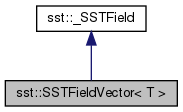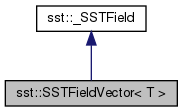Clients should use instances of this class to declare vector-like fields in their SST; the template parameter is the type of the vector's elements, just like with std::vector. More...
#include <sst.hpp>


Public Types | |
| using | value_type = T |
Public Member Functions | |
| SSTFieldVector (size_t num_elements) | |
| volatile T * | operator[] (const size_t &idx) const |
| size_t | size () const |
| Just like std::vector::size(), returns the number of elements in this vector. More... | |
| void | __attribute__ ((noinline)) debug_print(size_t row_num) |
 Public Member Functions inherited from sst::_SSTField Public Member Functions inherited from sst::_SSTField | |
| _SSTField (const size_t field_len) | |
| size_t | set_base (volatile char *const base) |
| char * | get_base () |
| void | set_rowLen (const size_t &_rowLen) |
Private Attributes | |
| const size_t | length |
Additional Inherited Members | |
 Public Attributes inherited from sst::_SSTField Public Attributes inherited from sst::_SSTField | |
| volatile char * | base |
| size_t | rowLen |
| size_t | field_len |
Clients should use instances of this class to declare vector-like fields in their SST; the template parameter is the type of the vector's elements, just like with std::vector.
Unlike std::vector, these are fixed-size arrays and cannot grow or shrink after construction.
| using sst::SSTFieldVector< T >::value_type = T |
|
inline |
|
inline |
|
inline |
|
inline |
|
private |
 1.8.13
1.8.13